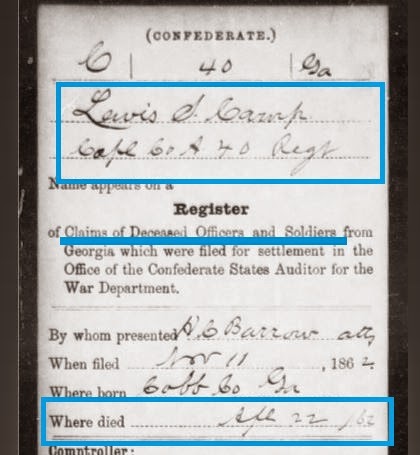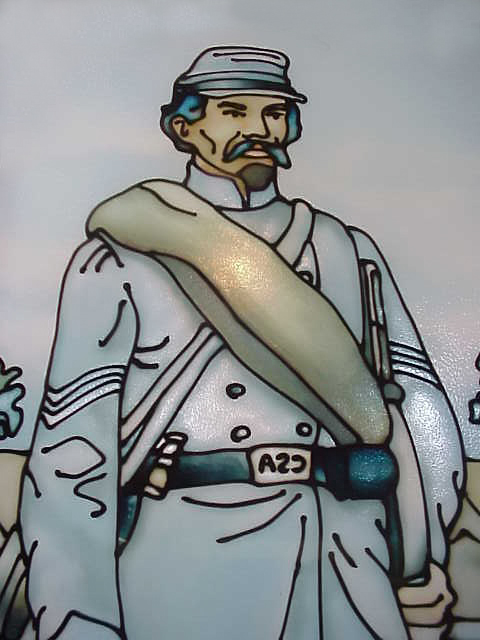 |
"String or Nothing" by Andrea Kirkby
source: flickr |
As I have been rereading my transcriptions of the Camp Family Letters*, I have come across several that have pointed me to additional family research. Sometimes it is a reference to a person, other times to an event or a place, all needing further research to clarify. Here are a few of those questions I have been able to answer.
Who is Lewis Camp? Who is Uncle Joe?
Knoxville,
Tenn
26th April 1862
My Dear Brother & Sister [Thomas and Mary Ragsdale Camp],
..... You
have doubtless learned ere this that Lewis Camp and James Langley are both dead. Lewis died Tuesday evening and his body
started home Thursday morning. Two hours
after the corpse left, Uncle Joe got here, but he had to wait there until
Friday morning. On Friday morning James
Langley died very unexpectedly, and Uncle Joe concluded to remain until this
morning and carry his corpse with him So
he left this morning .....
Raleigh Camp
Lewis Camp was the first cousin of Raleigh Camp, the son of Raleigh's uncle Josiah Washington Camp and Louisa Cooper Camp. According to the Roster of Confederate Soldiers of Georgia, vol. 4, Lewis had enlisted in Company A of the 40th Georgia Infantry on 10 Mar 1862. His death came six weeks later, 22 Apr 1862. Lewis' military records on fold3.com showed that when his father Josiah Camp later applied for a survivor's pension, Josiah stated that had Lewis died with no wife or child to survive him.
The Uncle Joe to whom Raleigh referred was Lewis' father, Josiah Camp. This paragraph amazed me with the quickness in which news seemed to be transmitted, probably by telegraph. Josiah Camp died in Tennessee on 22 April. His father must have left right away in order to arrive from Georgia on 24 April in hopes of bringing Lewis' body back to Georgia.
James Langley was also a member of Company A, 40th Georgia. For Uncle Joe to carry his corpse back to Georgia suggested that James was perhaps a family friend or neighbor.
 |
Lewis S. Camp, Confederate Records
source: fold3.com |
Who are all these people?
15 Apr 1866
Georgia, DeKalb County
Dear Daughter [Mary Ragsdale Camp],
..... Old
Jim was down at Sheffield last week. Bud and Sue were well. Sue said she would get through grammar this
week and that she has found she could learn anything she wanted to by studying
and that he was receiving the prize.
Nellie has improved her reading ago right well. Sissie says tell Fannie she has spelled [better].
..... Lou is
in a great trouble now about getting her fixups for the wedding. I do not know what she has told you about
it. The time is set, the tenth of May. If she has not wrote to you, wait until you hear from her about it.....
Your affectionate mother,
J C Ragsdale [Jemima Caroline Ragsdale]
I still have no idea who Jim, Bud, Sue, Nellie, and Sissie might be. I've tried several different strategies, looking at the siblings of Jemima Caroline Born Ragsdale and of her husband Elijah Newton Ragsdale as well as looking at their children, their children's spouses, and the few grandchildren I have previously been able to name. Identifying all these people will probably wait for another time.
Fannie was a family nickname for the second daughter of Thomas Camp and Mary Catherine Ragsdale Camp, Francis Estelle Camp. At the time of this letter, Fannie was seven and was attending school. It sounds as if a grandmother was trying to encourage a granddaughter in her school work.
The paragraph about the anxious bride got my attention. Lou is Louisa Jane Ragsdale, the sister of Mary Catherine Ragsdale. The wedding information turned out to be easy to locate. The Georgia Virtual Vault has a large number of digitized county marriage records, and I was able to find the record for this marriage in the DeKalb County records for 1866. Lou married Isaac Newton Scott on 10 May 1866. Two weeks before your wedding, who wouldn't have a few nerves?
 |
DeKalb County Marriage Book, 1856-1872, Book B
source: Georgia Virtual Vault |
What was the Lamar House?
Knoxville,
Tenn
Nov. 27th, 1866
My Dear Sister [Mary Ragsdale Camp],
..... I don’t now that I have anything to write that
will interest you though last week was rather a week of events at the Lamar House [Louisa tells about a man arrested for stealing money and a watch from someone staying at Lamar House]..... On
Thursday night the Yankees had a ball, and on Saturday Mr. and Mrs. Frances,
two of our boarders, returned..... [Capt. Bell, a person living at the hotel] went to take tea with some of his relatives Sunday evening and brought a little
teacake back with he. He went in the
office and give it to Newt .....
Your sister
Lou Scott
From the these events and others described in Lou's letter, it is possible that Lou's husband Newton Scott was working at the hotel, particularly with the reference to Capt. Bell coming into the office to see Newt. A check of Ancestry's collection of digitized city directories did not provide any additional information as no Knoxville city directory was published from 1861-1868 and the 1869 Knoxville directory did not list either a Newton Scott or an Isaac Scott residing there. The 1870 federal census listed Newt and Lou as living back in Georgia with Newt recorded as being a farmer.
A history of Knoxville' Bijou Theater and the Knox Heritage website both provide interesting tidbits about the history of this building constructed in 1817. Reading about the building's history as a private residence, hotel, hospital during the Civil War, and later as a theater has peeked my interest in going there when I'm next in Knoxville.
 |
Lamar House / Bijou Theater, Knoxville, Tennessee
source: www.knoxheritage.org |
One further note, in this letter Lou mentions receiving a letter from Bud. Could this be the same Bud to whom Jemima Born Ragsdale referred in the previous letter to Mary Ragsdale Camp?
Maybe there are a few more loose ends to tend to.
Lessons learned: It is worth spending time to learn more about people, places, and events associated with our family. It is another part of their story.
* These letters are part of the "Camp Family Papers, 1858-1877" which are housed in the Manuscript, Archives, and Rare Book Library (MARBL) of Emory University in Decatur, Georgia. The letters was transcribed using Transcript freeware. Some of the spelling, punctuation, and syntax were corrected in this post for ease in reading. ... is used to indicate portions of the letter which were omitted in the post. [ ] indicates a word or information I have inserted for clarity.



